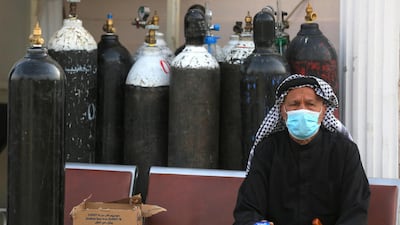Zahia is one of thousands of Syrian refugees living in Iraq who has been hesitant about being vaccinated against Covid-19 as the UN and Iraqi authorities push to inoculate as many people as possible.
Since April, more than 6,000 of the 300,000 refugees living in Iraq have received at least one shot of vaccine. The majority are women.
For refugees and internally displaced people to be vaccinated they must register online using their UN registration certificates or government-issued residency permits.
"At first I was hesitant, not very sure and perhaps a little bit scared. But then I heard about the campaign in the camp through health workers going door to door to raise awareness of the importance of receiving the vaccine to protect our loved ones," Zahia, who lives in Qushtapa refugee camp near the northern Kurdish city of Erbil, told The National.
The 26-year-old, who has been living in the camp for the past eight years, decided to have the vaccine after the majority of residents were inoculated against the disease.

“Health workers said it was safe, so I decided to take the vaccine and I am very glad now,” she said.
As part of World Refugee Day on Sunday, Iraqi authorities, along with the UN, have vaccinated 6,243 refugees and internally displaced people.
There are no children being vaccinated at the moment, but women account for 60 per cent of those to be immunised, a spokesman for the UN refugee agency told The National.
“Those who register in public health clinics or vaccination units in camps or register on the national platforms will acquire the vaccine,” he said.
The country's refugee vaccination drive started in April and UN officials and health authorities began to raise awareness about the importance of having a shot among refugees.
Iraq began its vaccine push in late March, but it stalled owing to hesitancy among citizens.
The country has a population of about 40 million and has so far vaccinated more than 600,000.
Iraq is home to There are about 1.2 million internally displaced people in Iraq and at least 4.6 million displaced people have returned home.
Both communities still need varying levels of support, the UN spokesman said.
About 254,000 of the refugees in the country are Syrians displaced by years of war, he said.
The country has dozens of camps for internally displaced people and refugees from the region, with the majority in the north.
But in recent months the Iraqi government announced its intentions to close the majority of camps for displaced Iraqis.
Vulnerable families have no choice but to return home – if they can return at all. Thousands fled their homes after a major ISIS offensive captured vast areas of Iraq and Syria in 2014.
The war against the terrorist group displaced about six million Iraqis, around 15 per cent of the country's population.
Future vaccination plans
There are plans to open a vaccination unit in Domiz camp, the biggest refugee site in the northern Kurdish region, with the support of the UN.
"This step aims to make available vaccinations for all refugees living in Domiz 1 and Domiz 2 camps, as well as those living in nearby camps and communities," the UNHCR said.
Health staff at the camp will also receive training about the Covid-19 online registration platform by UN and Kurdish health authorities, the agency said.
"Most health workers in and outside of camps were the first to be vaccinated in the first round of vaccinations launched in March 2021 all over Iraq," it said.



